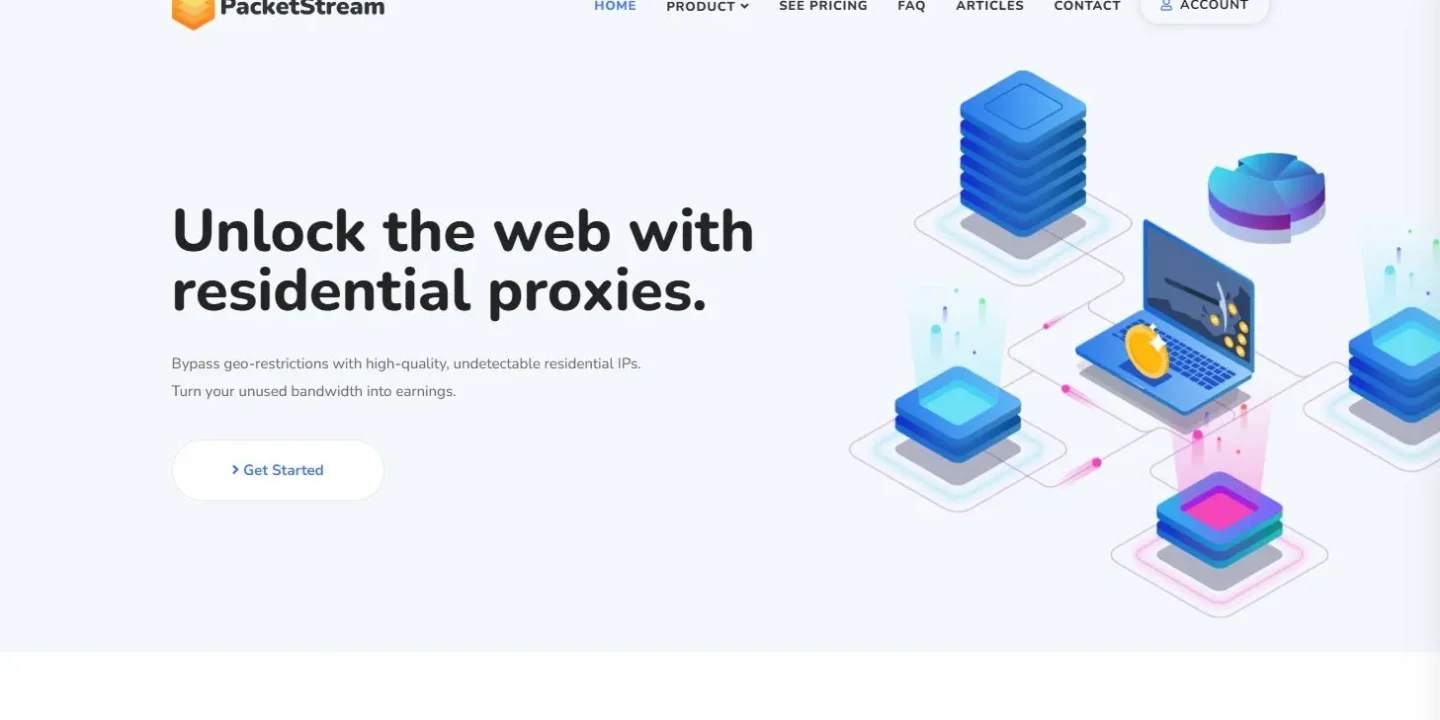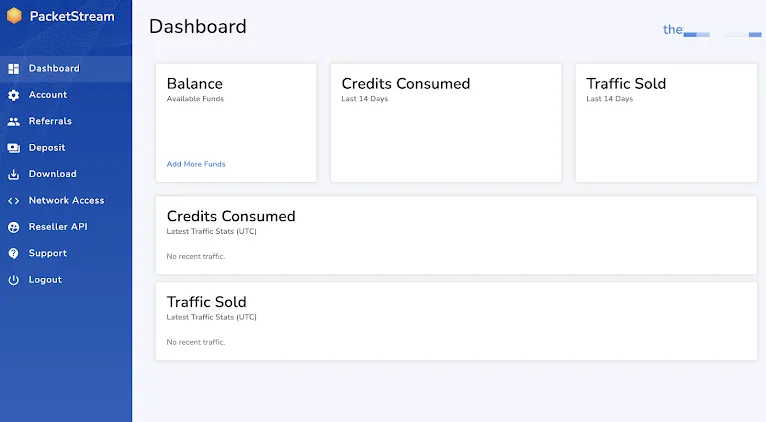
PacketStream, established in 2018 by entrepreneurs Arthur Aivazian and Ronald Bell, is a California-based company offering a peer-to-peer (P2P) residential proxy network. Residential proxies are sourced from real devices like PCs, smartphones, and tablets around the world, allowing users to bypass geo-restrictions and access data.
Unlike most residential proxy providers, which operate on a centralized model by obtaining and selling proxies directly to customers, PacketStream uses a peer-to-peer model. This means users can buy and sell residential IPs to each other. As a result, users can obtain proxies at a lower cost than with centralized networks, but the tradeoff is less reliability and speed compared to traditional proxy providers.
While PacketStream offers secure proxies, it doesn’t fully control the proxy IPs sold on its network, which increases the risk of unreliable IP addresses being added to the pool.
PacketStream: Plans and Pricing
PacketStream’s pricing is simple and based on bandwidth, with a flat rate of $1 per GB. This allows users to access the entire network of residential proxies, unlike other providers who charge for individual proxies. It also offers rotating proxies, so if one IP address doesn’t work, users can easily switch to another.
However, there is a notable downside: the minimum bandwidth purchase is 50 GB for $50. This means you can’t purchase a small amount (like $1 worth) to test out the service before committing to a larger purchase. If you run out of your 50 GB, you can buy additional bandwidth.
At $1 per GB, PacketStream offers some of the most competitive prices on the market. In comparison, other providers like IPRoyal charge $7 per GB, Bright Data charges $8.40 per GB, and Webshare charges $4.50 per GB.
While PacketStream does offer a free trial, it’s not standardized. You have to reach out to their sales team to request one, which may not be ideal for individual users who only want to test a small amount of bandwidth. The trial is better suited for businesses or users planning to make a significant investment in proxies.
PacketStream: Features
As a peer-to-peer network, PacketStream not only allows users to buy proxies but also offers the option to sell unused device bandwidth for money, starting at $0.10 per GB. Payments are made via PayPal, with a minimum payout of $5.
This feature gives users the opportunity to offset the cost of their proxy purchases by selling their bandwidth. Let’s explore some of the other features in more detail.
PacketStream Residential Proxies
PacketStream offers a peer-to-peer (P2P) residential proxy network that spans 190 countries, with IPs sourced from real devices. This system enables users to buy or sell residential proxies, ensuring they’re ethically sourced (i.e., consensually added by device owners who are paid for bandwidth). Here’s a breakdown of PacketStream’s residential proxies and related features:

Reliability and Speed
- Reliable IPs: During testing, PacketStream’s proxies provided reasonable speeds and were reliable, though speed varied depending on the country.
- Geographical Coverage: The network spans 190 countries, but unlike competitors, you cannot choose specific cities, limiting options for geo-restricted content.
- Protocol Limitations: PacketStream supports HTTP and HTTPS protocols, but it does not support SOCKS5, which could limit performance for specific use cases, especially those requiring reduced latency or higher speeds.
Use Cases for Residential Proxies
- Data Scraping: Residential proxies allow users to bypass geo-restrictions and scrape data, e.g., for price monitoring. If one IP is blocked, users can switch to another from PacketStream’s large network (7 million IPs).
- E-Commerce: Many people use residential proxies to avoid detection when automating purchases on e-commerce sites. Unlike datacenter proxies, residential proxies are less likely to be blocked as they originate from real devices.
- Limitations: Compared to rivals like Oxylabs (100 million IPs) and Bright Data (72 million IPs), PacketStream’s pool is significantly smaller. It also lacks support for mobile-specific IPs or ISP proxies, which offer better speed and data throughput for enterprises and app testing.
P2P Network and Selling Bandwidth
- Bandwidth Selling: PacketStream allows users to sell unused device bandwidth, earning $0.10 per GB. Payments are made via PayPal, with a minimum payout of $5.
- Easy Setup: Users can install the PacketStream client on Windows or macOS to share their bandwidth. The client is lightweight and only requires a stable internet connection to run.
Pricing
- Affordable Pricing: PacketStream charges $1 per GB, making it one of the most cost-effective options. The minimum bandwidth purchase is 50 GB for $50, which may be a barrier for smaller users who only need a small amount of bandwidth.
- Comparison to Competitors: In comparison, competitors like IPRoyal ($7/GB), Bright Data ($8.40/GB), and Webshare ($4.5/GB) have higher rates. PacketStream’s model provides excellent value for personal or small business users but falls short for large enterprises needing more advanced features.
Reseller API
- White-Label Reselling: PacketStream also offers reselling and white-label services for those interested in starting their own proxy business. You can brand PacketStream’s network and sell it as your own, though this feature is designed for businesses, not individual users.
Ease of Use
- User-Friendly Interface: PacketStream’s interface is one of the simplest among proxy providers. It has a clean design, with all features neatly organized in a sidebar and dashboard. The platform’s simplicity makes it accessible even for beginners.
- Lack of Browser Extension: One drawback is that PacketStream does not offer a browser extension, which would streamline proxy management. Users must rely on the desktop interface to switch proxies.
Customer Support
- Limited Support Options: PacketStream offers customer support only via email, with no live chat or phone options. Response times are typically within 48 hours. Additionally, the platform lacks extensive self-help resources compared to its competitors.
Comparison to Competitors
- Bright Data: Offers a much larger pool (72 million IPs) and additional features such as web scraping APIs, ISP proxies, and datacenter proxies. However, it is significantly more expensive ($8 per GB) than PacketStream.
- Oxylabs: Similar to Bright Data, Oxylabs offers a vast pool of over 100 million IPs and more advanced features, but its pricing is also higher ($8 per GB). The cost of running a P2P network allows PacketStream to remain affordable.
- Webshare: With a pool of 30 million+ IPs, Webshare offers a competitive alternative, but its pricing ($4.5 per GB) is still higher than PacketStream’s.
Final Thoughts
PacketStream is a strong option for individuals or small businesses seeking affordable residential proxies for everyday use like data scraping or e-commerce activities. However, it’s not ideal for large-scale enterprise tasks due to its smaller IP pool, lack of advanced proxy types (like ISP proxies), and limited customer support. If affordability is your primary concern, PacketStream stands out, but for more demanding proxy needs, you may want to consider more feature-rich providers like Bright Data or Oxylabs.








